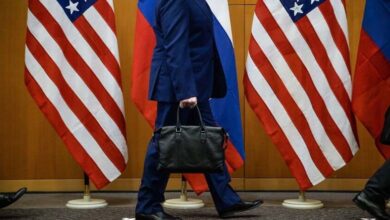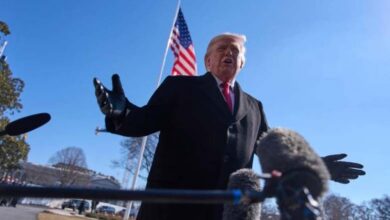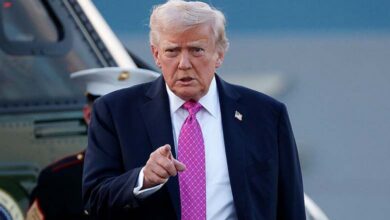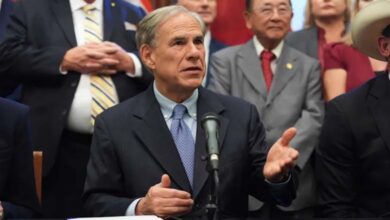US Shows Partiality in Dealing with Syrian Opposition Parties

President of the National Coalition for Opposition and Revolutionary Forces of Syria Salem al-Meslet confirmed, in an interview with Asharq Al-Awsat in Washington, that talks with US parties have been “largely positive” but needed more action to reflect their positivity on the ground.
Meslet, 62, was elected as President of the Coalition last July. He completed his studies in political science in the US in 1978 and later worked as a researcher at the Gulf Research Center in Dubai, where he served as Deputy Director General.
Apart from holding several positions, including chairman of the Syrian Council of Tribes and Clans, Meslet is also the sheikh of the Jubour tribe in Syria and Iraq.
After holding a series of political meetings in Washington, Meslet clarified that the Coalition’s delegation members have met with several US officials from the White House, Department of State, and Department of Defense.
More so, Coalition delegates met with both Republican and Democratic legislators.
According to Meslet, all US officials reaffirmed the US’ commitment to supporting the Syrian revolution and implementing the Caesar Syria Civilian Protection Act.
However, Meslet revealed Coalition delegation members were spotting a difference in the treatment of US officials when it comes to various Syrian opposition factions, favoring one party over the other, in a hint aimed at the Syrian Democratic Forces (SDF).
This partiality “causes imbalance among Syrians,” said Meslet, adding that he was convinced that “working with the US administration is important, especially that it is new and without a clear position.”
Meslet pointed out that the US is present in northeast Syria in Kurdish areas, where American distinction in dealing with the Syrian parties becomes “apparent.”
“Friends stand with all parties and not with one party at the expense of another. The Kurds cannot be neglected at the expense of the Arab tribes or the Turkmen, and vice versa as well. We bear the defense of all these parties, and they are our people in Syria,” Meslet told Asharq Al-Awsat.
He demanded the US administration continues to pressure and boycott the Syrian regime, noting that implementing the Caesar Syria Civilian Protection Act did not harm Syrians and instead pushed the regime to stop its oppression.
“The US administration is still committed to implementing the Caesar Act, and the Syrian people do not die because of that. It is the sanctions of the Syrian regime that are bringing war and destruction to Syrians and giving Iranians and regime allies the country’s wealth, oil and facilities,” said Meslet.
“We are representing the women living in refugee camps near borders and standing in long ques to buy bread in regime-controlled areas,” he added.
“Our maxim is that we represent all Syrians,” affirmed Meslet.
“The purpose of our visit is to restore the political track on the table of meetings with the Americans, because the matter has become limited to humanitarian and relief aid in many countries of the world, and we thank everyone who contributes to this framework, but our cause is a political one,” said Meslet.
“We want a political solution to end this ordeal. Ten years is enough for us to see real actions now, seeing our country liberated from Iranian and Russian militias, and Assad (Syrian regime head Bashar al-Assad) is the standard guardian of the Iranian project.”
“This is a difficult period and requires Arab solidarity more than anything else. Assad does not only harm Syria, but all Arab countries. This is an Arab-international decision,” he added.
When asked about Jordan’s inclination to cooperate economically with the Syrian regime, Meslet said that “normalization with the Syrian regime rewards it for the crimes it committed against Syrians.”
“I don’t believe that Jordan wants that, and it had long held good positions with our people.”
Recommending for Jordan to refrain from taking such a step, Meslet warned that the “Syrian regime poses a threat to Jordan and Arabs the same way it does to Syrians themselves.”
“We don’t not advise any country to do so, but rather to think about the millions of displaced, killed and refugee Syrians.”
Meslet pointed out that the decision to normalize and restore relations with the Syrian regime was discussed with the US State Department, which advised Arab countries against making the move.
More so, the US State Department reassured the Coalition’s delegation that it fully recognizes the dangers of normalizing ties with the Syrian regime and that they were far from it.
As for the upcoming meetings of the Syrian Constitutional Committee in Geneva on October 18, Meslet said they were scheduled after three meetings that took place with the UN Special Envoy for Syria, Geir Pedersen.
“This is the sixth round, and I am not optimistic,” said Meslet.
Elaborating on his pessimism, Meslet said: “The meetings revolve around the marginality of the constitution proposed by the United Nations, not the content.”
“Yes, we are with UN Resolution 2254, and with international efforts to end the Syrian crisis, and we have agreed to all the requirements of the international envoy, but the delegation of the Syrian regime is the one who is procrastinating in the political processes, and they are not serious,” he explained.












